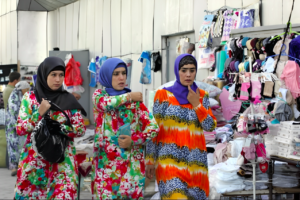Asenior Azerbaijani official condemned what she referred to as Armenia’s crimes toward the environment during its occupation of Azerbaijani territories.
In a written statement issued on Monday, Azerbaijan’s Commissioner for Human Rights (Ombudsman) Sabina Aliyeva said Armenia “has not only committed war crimes against humanity and peace while occupying Azerbaijani territory for 30 years, but it has also seriously endangered the ecological security of the area and is still doing so. The destruction of agricultural lands, water basins, atmosphere, forest fund, flora and fauna, mineral resources and energy sources caused disruptions in ecological balance not just in our nation but also across the rest of the region. All this proves once again that Armenia commits environmental crimes and does not fulfill its obligations under international conventions on ecology and environment.”
She also criticized the silence of international organizations in the face of the situation. Aliyeva called for the prevention of crimes endangering ecological balance and punishment of perpetrators, besides “ensuring that each state complies with requirements of the relevant international and national legislative acts.”
Relations between the two former Soviet republics have been tense since 1991 when the Armenian military occupied Karabakh, a territory internationally recognized as part of Azerbaijan and seven adjacent regions.
In the fall of 2020, Azerbaijan liberated several cities, villages and settlements from Armenian occupation during 44 days of clashes. The war ended with a Russia-brokered peace agreement.
Despite the ongoing talks on a peace agreement, tensions between the neighboring countries increased in recent months over the Lachin corridor, the only land route giving Armenia access to Karabakh.
Aliyeva pointed out that one of Armenia’s new initiatives, that may create a regional environmental problem, was the desire to build a large metallurgical plant worth $70 million with an annual production capacity of 180,000 tons on an area of 16,500 square meters in the village of Arazdayan in the region bordering Azerbaijan and Türkiye.
“The construction of such a new plant in that area and the discharge of waste into the Araz River, the second largest river of the South Caucasus, may lead to pollution not only this river but also Arpachay. The toxic gases released into the air, as a result of the operation of the plant to be built, will have a serious impact on fauna and flora. Moreover, if the metallurgical plant starts operating, it will cause environmental and ecosystem damage in a wide area and pollute the air with toxic waste. With this, Armenia again is violating the norms and principles of international law, especially the provisions of the Convention on Environmental Impact Assessment in a Transboundary Context (ESPOO) of the United Nations Economic Commission for Europe,” she said.
Aliyeva also pointed out a controversial nuclear power plant near Armenia’s border with Türkiye. “The Metsamor plant, which continues to operate in Armenia despite having reached the end of its operational period, poses a serious threat to the entire South Caucasus region, not just Azerbaijan and Armenia,” she said.
On other environmental concerns, Aliyeva noted that the discharge of chemically-laced water from Armenia’s large mining enterprises, the Gajaran copper-molybdenum plant and the Gafan ore processing plant, as well as from the Ley-Lichkivaz gold deposits, into the cross-border river Okchuchay for many years has a negative effect on the quality of water resources in the region, “which directly threatens people’s rights to live, and live in a healthy environment.”
“The Sarsang reservoir, which serves as a source of irrigation for agricultural areas, serves as a testament of Armenia’s deliberate pollution of water sources. In addition, in Resolution No. 2085 of the Parliamentary Assembly of the Council of Europe dated January 26, 2016, it was noted that the contradiction of the Sarsang reservoir in terms of technical parameters poses a threat to people’s lives and health, besides being a serious disaster; and Armenia’s actions lead to global environmental problems, which qualify as acts of aggressiion,” she said. “Studies demonstrate that it takes many years and plenty of cash to restore a destroyed ecosystem in liberated lands. The current landmine issue, which has turned into an urgent issue for our country and has caused numerous casualties and injuries, delays the safe return of thousands of former internally displaced persons (IDPs) to their homelands and creates an obstacle to peace and large-scale construction works in our liberated territories,” she added.
Source: Daily Sabah











